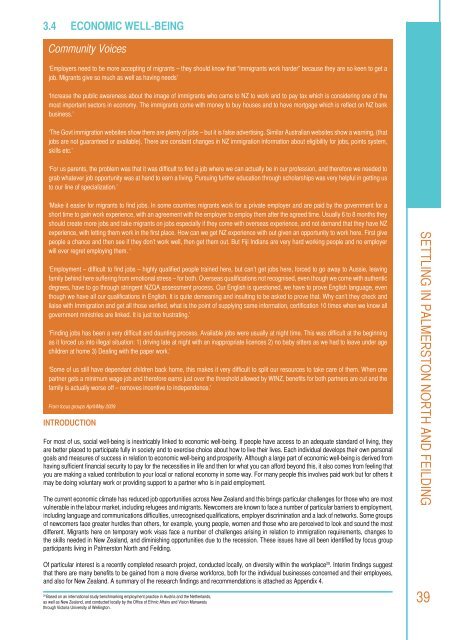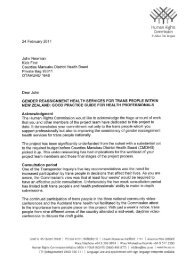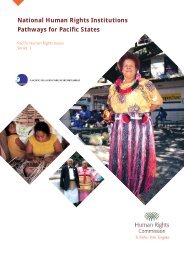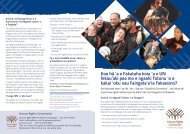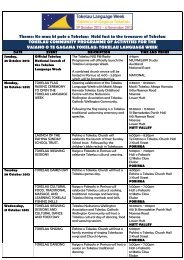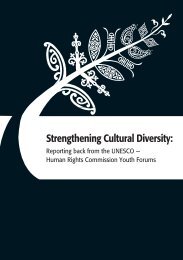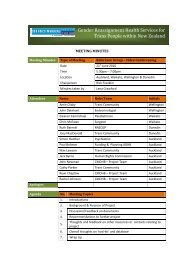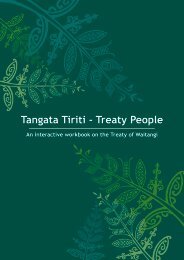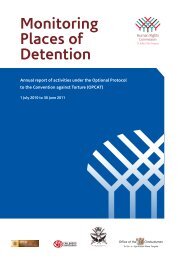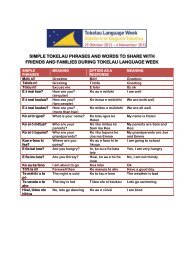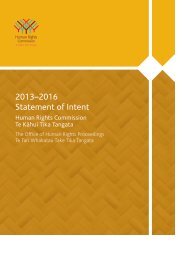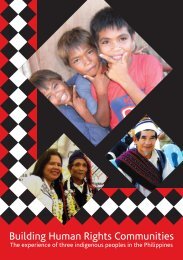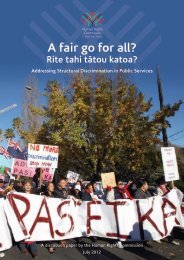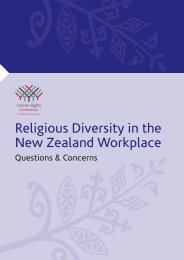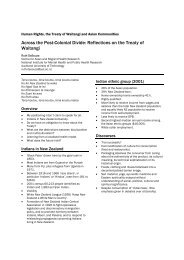Settling In Palmerston North and Feilding - Human Rights Commission
Settling In Palmerston North and Feilding - Human Rights Commission
Settling In Palmerston North and Feilding - Human Rights Commission
You also want an ePaper? Increase the reach of your titles
YUMPU automatically turns print PDFs into web optimized ePapers that Google loves.
3.4 ECONOMIC WELL-BEINGCommunity Voices‘Employers need to be more accepting of migrants – they should know that “immigrants work harder” because they are so keen to get ajob. Migrants give so much as well as having needs’‘<strong>In</strong>crease the public awareness about the image of immigrants who came to NZ to work <strong>and</strong> to pay tax which is considering one of themost important sectors in economy. The immigrants come with money to buy houses <strong>and</strong> to have mortgage which is reflect on NZ bankbusiness.’‘The Govt immigration websites show there are plenty of jobs – but it is false advertising. Similar Australian websites show a warning, (thatjobs are not guaranteed or available). There are constant changes in NZ immigration information about eligibility for jobs, points system,skills etc.’‘For us parents, the problem was that it was difficult to find a job where we can actually be in our profession, <strong>and</strong> therefore we needed tograb whatever job opportunity was at h<strong>and</strong> to earn a living. Pursuing further education through scholarships was very helpful in getting usto our line of specialization.’‘Make it easier for migrants to find jobs. <strong>In</strong> some countries migrants work for a private employer <strong>and</strong> are paid by the government for ashort time to gain work experience, with an agreement with the employer to employ them after the agreed time. Usually 6 to 8 months theyshould create more jobs <strong>and</strong> take migrants on jobs especially if they come with overseas experience, <strong>and</strong> not dem<strong>and</strong> that they have NZexperience, with letting them work in the first place. How can we get NZ experience with out given an opportunity to work here. First givepeople a chance <strong>and</strong> then see if they don’t work well, then get them out. But Fiji <strong>In</strong>dians are very hard working people <strong>and</strong> no employerwill ever regret employing them. ‘‘Employment – difficult to find jobs – highly qualified people trained here, but can’t get jobs here, forced to go away to Aussie, leavingfamily behind here suffering from emotional stress – for both. Overseas qualifications not recognised, even though we come with authenticdegrees, have to go through stringent NZQA assessment process. Our English is questioned, we have to prove English language, eventhough we have all our qualifications in English. It is quite demeaning <strong>and</strong> insulting to be asked to prove that. Why can’t they check <strong>and</strong>liaise with Immigration <strong>and</strong> get all those verified, what is the point of supplying same information, certification 10 times when we know allgovernment ministries are linked. It is just too frustrating.’‘Finding jobs has been a very difficult <strong>and</strong> daunting process. Available jobs were usually at night time. This was difficult at the beginningas it forced us into illegal situation: 1) driving late at night with an inappropriate licences 2) no baby sitters as we had to leave under agechildren at home 3) Dealing with the paper work.’‘Some of us still have dependant children back home, this makes it very difficult to split our resources to take care of them. When onepartner gets a minimum wage job <strong>and</strong> therefore earns just over the threshold allowed by WINZ, benefits for both partners are cut <strong>and</strong> thefamily is actually worse off – removes incentive to independence.’From focus groups April/May 2009<strong>In</strong>troductionFor most of us, social well-being is inextricably linked to economic well-being. If people have access to an adequate st<strong>and</strong>ard of living, theyare better placed to participate fully in society <strong>and</strong> to exercise choice about how to live their lives. Each individual develops their own personalgoals <strong>and</strong> measures of success in relation to economic well-being <strong>and</strong> prosperity. Although a large part of economic well-being is derived fromhaving sufficient financial security to pay for the necessities in life <strong>and</strong> then for what you can afford beyond this, it also comes from feeling thatyou are making a valued contribution to your local or national economy in some way. For many people this involves paid work but for others itmay be doing voluntary work or providing support to a partner who is in paid employment.The current economic climate has reduced job opportunities across New Zeal<strong>and</strong> <strong>and</strong> this brings particular challenges for those who are mostvulnerable in the labour market, including refugees <strong>and</strong> migrants. Newcomers are known to face a number of particular barriers to employment,including language <strong>and</strong> communications difficulties, unrecognised qualifications, employer discrimination <strong>and</strong> a lack of networks. Some groupsof newcomers face greater hurdles than others, for example, young people, women <strong>and</strong> those who are perceived to look <strong>and</strong> sound the mostdifferent. Migrants here on temporary work visas face a number of challenges arising in relation to immigration requirements, changes tothe skills needed in New Zeal<strong>and</strong>, <strong>and</strong> diminishing opportunities due to the recession. These issues have all been identified by focus groupparticipants living in <strong>Palmerston</strong> <strong>North</strong> <strong>and</strong> <strong>Feilding</strong>.SETTLING IN PALMERSTON NORTH AND FEILDINGOf particular interest is a recently completed research project, conducted locally, on diversity within the workplace 29 . <strong>In</strong>terim findings suggestthat there are many benefits to be gained from a more diverse workforce, both for the individual businesses concerned <strong>and</strong> their employees,<strong>and</strong> also for New Zeal<strong>and</strong>. A summary of the research findings <strong>and</strong> recommendations is attached as Appendix 4.29Based on an international study benchmarking employment practice in Austria <strong>and</strong> the Netherl<strong>and</strong>s,as well as New Zeal<strong>and</strong>, <strong>and</strong> conducted locally by the Office of Ethnic Affairs <strong>and</strong> Vision Manawatuthrough Victoria University of Wellington.39


